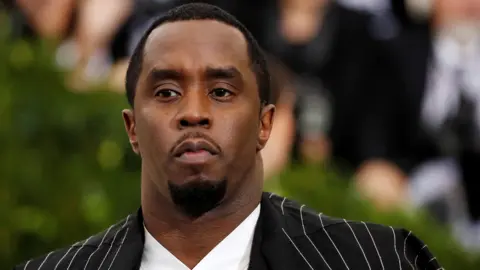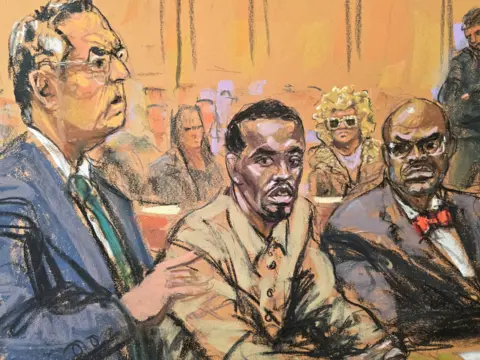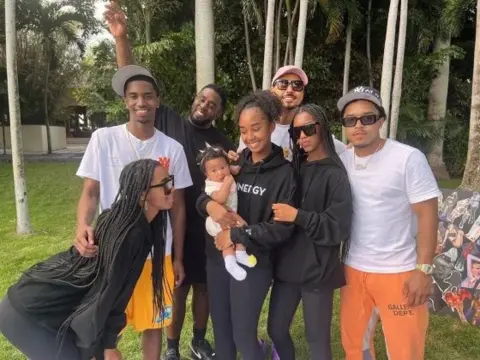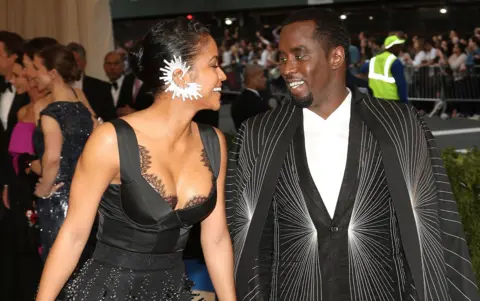Diddy called witnesses from prison, prosecutors say
 Reuters
ReutersSean "Diddy" Combs has been breaking prison rules by contacting potential witnesses in his upcoming sex trafficking trial, prosecutors have alleged.
The music mogul is accused of making "relentless efforts" to "corruptly influence witness testimony", by using other inmates' telephone accounts, and using three-way calls to speak to people who are not on his approved contacts list.
Prosecutors said a review of recorded calls also found that Mr Combs instructed his family to contact potential witnesses in his case, they said in a court filing.
The 55-year-old rapper, who has pleaded not guilty to all the charges and vehemently denied any wrongdoing, appeared in court on Tuesday as a judge weighed the new evidence, part of which was found in a notebook in his jail cell.
At the hearing on Tuesday, a judge ordered that prosecutors destroy copies of materials seized in Mr Combs' jail cell as the judge weighed whether they could be used in court.
Judge Arun Subramanian, who is overseeing the case, ruled that the US Attorney's Office for the Southern District of New York cannot use the material or any excerpts from it during Combs’ upcoming bail hearing on Friday. The judge said he would examine the materials and weigh in on whether that can be used at trial.
Mr Combs’ defence team claimed that government prosecutors illegally seized his personal notes during a search of his jail cell at the Metropolitan Detention Center in Brooklyn, where he has been detained since his arrest on 16 September in the lobby of a Manhattan hotel. They argued some of the materials detailed information that is protected under attorney-client privilege, which shields information discussed between a client and an attorney.
The government detailed that a "filter" team went through all materials before they were given to prosecutors. "The information at issue is not protected," prosecutor Mary Slavik said at the hearing. They argued the information could be considered obstruction of justice and negate the typical protections of attorney-client privilege.
The musician, who is best known for 1990s hits such as I'll Be Missing You and Mo' Money, Mo' Problems, has been denied bail since his arrest, with multiple judges citing a risk that he might tamper with witnesses. He's currently in custody in Manhattan.
His lawyers made a renewed bid for bail last week, proposing a $50m (£39.6m) package that would see Mr Combs be monitored around the clock by security personnel, while under house arrest.
Lawyer Alexandra Shapiro argued it was impossible for the musician to prepare for trial from behind bars because of the "incredibly voluminous" amount of material to review, especially without a laptop computer.
She also said his preparation has been hampered by conditions at the jail, including frequent lockdowns and officers taking away the pens he uses to take notes.
Detention is stripping Mr Combs of "any real opportunity" to be ready for trial, violating his rights under the US Constitution, Shapiro said.
In response, prosecutors argued that the request for bail should be denied, alleging that Mr Combs "poses serious risks of danger and obstruction of these proceedings".
 Reuters /Jane Rosenberg
Reuters /Jane RosenbergIn court documents, they accused the star of orchestrating social media posts in order to "influence a potential jury pool" at his trial.
Amongst those efforts, they cited an Instagram statement posted by a woman known only as "witness two", countering allegations made by singer Dawn Richard in a civil lawsuit against Mr Combs.
Prosecutors alleged that her statement was drafted with Mr Combs during "multiple texts" and "multiple calls" from prison.
They further alleged there was a "strong inference" that Mr Combs "paid witness two, after she posted her statement".
- The charges against Sean "Diddy" Combs explained
- The parties that led to Diddy's downfall
- Diddy's trial: When does it start, and what happens next?
- Diddy assault video cements the downfall of a hip-hop icon
- Chaos reigns - the notorious jail where Diddy is being held
A video posted by the star's seven children on 5 November was also cited as evidence of a "public relations strategy to influence this case".
The video, which was reported by multiple media outlets, showed the family wishing Mr Combs a happy birthday during a prison phone call.
"The defendant then monitored the analytics - ie audience engagement - and explicitly discussed with his family how to ensure that the video had his desired effect on potential jury members in this case," prosecutors said.
 Diddy / Instagram
Diddy / InstagramMr Combs was also accused of using the phone accounts of at least eight other inmates to make calls, which is against prison regulations; and of "directing others" to orchestrate payment for this access.
Prosecutors characterised Mr Combs as running a "relentless" scheme to "contact potential witnesses, including victims of his abuse who could provide powerful testimony against him".
'Uncanny ability'
Urging the judge to deny Mr Combs' request for bail, the prosecutors wrote that "no set of conditions" could eliminate the potential risks to the trial.
"The defendant has demonstrated an uncanny ability to get others to do his bidding - employees, family members, and [prison] inmates alike," they claimed.
"There is no reason to believe that private security personnel would be immune."
Prosecutors also rejected criticism of the conditions at the Metropolitan Detention Center in Brooklyn, citing an interview from the star's lawyer Marc Agnifilo, who said "food’s probably the roughest part" of Mr Combs' adjustment to life behind bars.
The BBC has contacted his legal team for a response.
 EPA
EPAMr Combs' legal troubles began last November, when his ex-partner Cassandra "Cassie" Ventura filed a civil lawsuit, alleging incidents of rape and physical assault between 2007 and 2018.
Although the case was quickly settled out of court, it led to a flurry of similar accusations and an investigation by the US Government.
The star's properties were raided by federal agents in March, and he was arrested in New York in September.
Mr Combs was charged with three counts of sex trafficking and racketeering, in a federal indictment that described allegations of drug-fuelled, days-long sexual performances dubbed as "Freak Offs".
The musician is simultaneously facing more than two dozen civil cases by men and women accusing him of sexual assault, rape and sexual exploitation.
The star has vehemently denied all of the charges against him, and the claims in the civil suits, arguing that the sexual encounters at the heart of his criminal case were all consensual.
2 lawsuits filed against lawyer
In a separate development on Monday, two separate lawsuits were filed against one of the lawyers known for spearheading more than 120 lawsuits against Mr Combs.
One lawsuit, filed by an unnamed "high-profile individual" against Texas attorney Tony Buzbee, alleged that Mr Buzbee attempted to extort him by threatening to make public “entirely fabricated and malicious allegations of sexual assault".
In court documents obtained by the BBC, the plaintiff identified himself as a former associate of Diddy and acknowledged attending events with the embattled music mogul.
The lawsuit against Mr Buzbee claims the Houston attorney follows a "clear playbook" for extorting celebrities involving fabricating allegations and demanding letters seeking payment.
The lawsuit alleges that if the demands are not met, he turns to the media to apply public pressure.
Mr Buzbee, who denies wrongdoing, described the filing as a “last-ditch attempt” to stop him from naming the individual.
“It is obvious that the frivolous lawsuit filed against my firm is an aggressive attempt to intimidate or silence me and ultimately my clients,” he said in a statement sent to the BBC.
"No amount of money was included in the demand letters," he wrote. "No threats were made. The demand letters sent are no different than the ones routinely sent by lawyers across the country in all types of cases.”
A second legal claim was filed Monday, by an unnamed woman, in New York alleging abusive behaviour toward women.
The summons states Mr Buzbee abused his power as an attorney and violated the3 unnamed woman while representing her as a client.
“Plaintiff brings these causes of action to address Defendant's misconduct, which began with his assault of Plaintiff and escalated during his representation of her in divorce proceedings, where he prioritized concealing his actions over safeguarding her legal interests,” the claim states.
In a statement to the BBC, the attorney who filed the suit, Jeremy Bohrer called Mr Buzbee a hypocrite.
“There is nothing worse than when a black hat masquerades as a white hat.”
Mr Buzbee has not yet responded to the second lawsuit. BBC News has reached out for comment.
